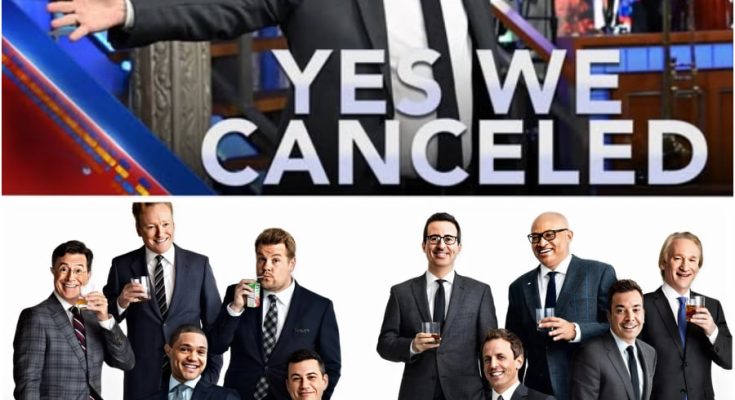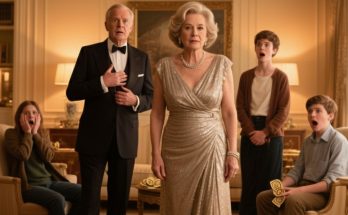Late-Night Rivals Unite on Colbert’s Stage After Shocking Late Show Cancellation
New York, NY — In a rare and powerful display of unity, Stephen Colbert’s late-night rivals gathered on his stage just one day after CBS stunned the industry by announcing the cancellation of The Late Show. The moment was more than camaraderie — it was a pointed statement about free speech, comedy, and the mounting pressures shaping television’s most politically charged genre.
A Sudden End to a Late-Night Fixture
On May 1, 2025, CBS confirmed The Late Show with Stephen Colbert would end its run. The decision blindsided fans and industry insiders alike. Colbert’s blend of sharp political satire and incisive interviews had made him a cultural fixture for more than a decade, particularly during America’s most turbulent political years.
His loyal audience and consistent ratings made the move all the more perplexing — and sparked immediate speculation about what forces were at play behind the scenes.
Rivals Cross the Line — Onto Colbert’s Stage
The night after the announcement, three of Colbert’s biggest competitors — Jimmy Fallon, Jimmy Kimmel, and Trevor Noah — walked onto The Late Show set unannounced.
Fallon opened with a statement that set the tone:
“We’re here to support our friend Stephen. This isn’t just about one show; it’s about all of us in late-night television standing together.”
Kimmel followed:
“In times like these, we need to remember that our voices matter, and we’re stronger united.”
Trevor Noah, visibly emotional, added:
“Stephen has always pushed the envelope and challenged us to think critically. We owe so much of our success to his influence.”
The segment blended lighthearted nostalgia with a shared recognition of the moment’s gravity. Each host recalled favorite Late Show moments and the impact Colbert’s work had on their own craft.
The Shadow Over the Tribute
While the on-stage solidarity made headlines, whispers of a more complex story emerged. Multiple insiders suggested CBS’s decision was not just about programming strategy.
Shifts in audience demographics, growing competition from streaming, and internal debates about Colbert’s unapologetically political monologues may have all played a role.
Some industry sources went further, alleging that political pressure from corporate and advertiser circles had intensified, making Colbert’s biting commentary increasingly unwelcome in a network environment wary of backlash.
Comedy’s Role in a Politically Charged Era
The tribute naturally turned to a broader discussion: what does Colbert’s exit mean for the future of political satire?
For years, late-night hosts have served as cultural commentators and political critics. Colbert, in particular, made speaking truth to power a defining feature of his show. His departure, many fear, could mark the start of a more cautious, less confrontational era for network comedy.
Industry analysts warn that other hosts might pull back from controversial topics, worried about crossing unseen lines in the network playbook.
Colbert’s Response
Appearing via video link, Colbert delivered a heartfelt thank-you:
“Comedy is about more than just laughs; it’s about pushing boundaries and speaking truth to power. I hope this moment inspires all of us to continue that fight.”
His words underscored the emotional stakes of the night and reinforced the belief — shared by all present — that comedy remains one of society’s most potent forms of resistance.
What Comes Next
As the episode closed, the four comedians urged viewers to support comedy that challenges perspectives rather than avoids them. The unity on Colbert’s stage sent a clear message: the fight for creative freedom in late-night TV is not just about one host’s career — it’s about the future of the genre.
The questions now linger: Will Colbert find a new platform for his voice? Will networks retreat from politically charged humor? And can the spirit of solidarity seen on that stage survive the competitive realities of television?
One thing is certain — whatever the future holds, Stephen Colbert’s influence on late-night comedy, and on the conversation about free speech in entertainment, will resonate for years to come.





